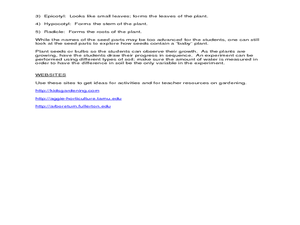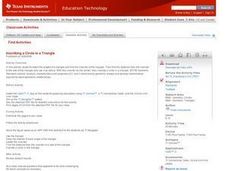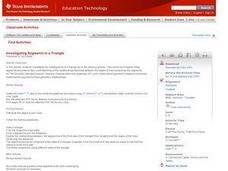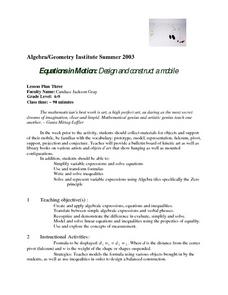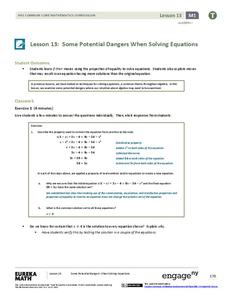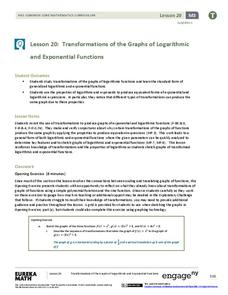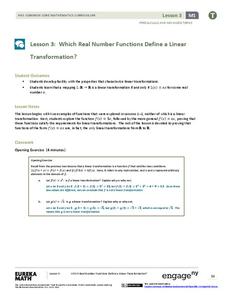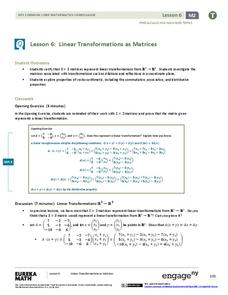Discovery Science Center
Kindergarten Observing, Comparing and Contrasting
Although this is a science instructional activity, it can be adapted to help meet Common Core standards in math as well. Starting scientists describe physical properties of objects and explore three forms of water. To address the Common...
Curated OER
Properties of Parabolas
Have your learners investigate parabolas. In this Algebra II lesson plan, students explore the basic definition of a parabola by using Cabri Jr. to create a parabola given the focus and directrix. Students interpret the equation...
Texas Instruments
Investigating Segments in a Quadrilateral
Investigate the properties of the shape formed by connecting the midpoints of adjacent sides of a quadrilateral. For this properties of the shape formed by connecting the midpoints of adjacent sides of a quadrilateral lesson, learners...
Curated OER
Special Segments in Triangles
Students identify important properties of triangles. For this geometry lesson, students differentiate between medians, bisectors and altitudes in a triangle. They identify the properties of these important segments.
Curated OER
Rotations in the Plane
Pupils investigate the properties of a rotation as they use technology (Cabri, Jr.) to observe the relationship between the pre-image and the image formed by the rotation. The lesson provides ample opportunity for learners to conjecture...
Curated OER
Conics in Geometry
High schoolers analyze characteristics and properties of two and three-dimensional shapes in this geometry instructional activity. They follow detailed directions to use the Cabri Geometry II Application on their TI-89 calculator to...
Curated OER
Inscribing a Circle in a Triangle
Pupils investigate inscribing a circle in a triangle. They use Cabri Jr. to draw a triangle, locate the incenter, and use the distance from the incenter to a side of the triangle to inscribe a circle. The dynamic nature of the geometry...
Curated OER
Measuring Angles in a Quadrilateral
High schoolers explore quadrilaterals in this geometry instructional activity. They will draw a quadrilateral, measure the angles, and find the sum of the measures of the interior angles using Cabri Jr. The interactive capabilities of...
Curated OER
Investigating Segments in a Triangle
Pupils investigate segments in a triangle by constructing a triangle using Cabri Jr. They construct segments within the triangle that lie on the midpoints of the triangle's sides. Learners then compare the slope of base of the triangle...
Curated OER
Investigating Lengths of Segments in a Triangle
Pupils explore the midsegment of a triangle in the geometry lesson. They draw and measure the segment joining the midpoints of the two sides of a triangle and compare its length to the length of the third side of the triangle. The...
Curated OER
Equations in Motion: Design and construct a mobile
Students participate in a lesson plan that covers the concepts of solving equations and inequalities. To master the concept they must demonstrate visually and verbally how both sides of an equation must be balanced. They construct a...
Curated OER
Ratios in Right Triangles
Learners calculate the sides of right triangles in this trigonometric ratios lesson. They use Cabri Jr. software and TI-83 or TI-84 calculators to find the side lengths and their ratios to each other for various triangles. The provided...
Curated OER
Classifying Triangles Based On Properties of Angles
The interactive instructional activity featured here calls for the use of a Smartboard for sorting and classifying shapes. Then, pupils discuss the rules they followed for sorting their shapes, particularly focusing on the properties of...
Curated OER
Marshmallow Geometry
In this three-dimensional shapes geometry lesson, learners identify geometric solids and name their properties. They define "face," "edge," and "vertex," and construct geometric solids using marshmallows as vertices and toothpicks as edges.
EngageNY
Three-Dimensional Space
How do 2-D properties relate in 3-D? Lead the class in a discussion on how to draw and see relationships of lines and planes in three dimensions. The ability to see these relationships is critical to the further study of volume and...
EngageNY
Some Potential Dangers When Solving Equations
Need a less abstract approach to introducing extraneous solutions? This is it! Young mathematicians explore properties used to solve equations and determine which operations maintain the same solutions. They...
Willow Tree
Solving Inequalities
What does solving an inequality have in common with solving an equation? Almost everything! A math resource focuses on the one exception. The examples lead learners through the steps of solving an equality when multiplying or...
EngageNY
Transformations of the Graphs of Logarithmic and Exponential Functions
Transform your lesson on transformations. Scholars investigate transformations, with particular emphasis on translations and dilations of the graphs of logarithmic and exponential functions. As part of this investigation, they examine...
EngageNY
Which Real Number Functions Define a Linear Transformation?
Not all linear functions are linear transformations, only those that go through the origin. The third lesson in the 32-part unit proves that linear transformations are of the form f(x) = ax. The lesson plan takes another look at examples...
EngageNY
Graphing the Logarithmic Function
Teach collaboration and communication skills in addition to graphing logarithmic functions. Scholars in different groups graph different logarithmic functions by hand using provided coordinate points. These graphs provide the basis for...
EngageNY
Linear Transformations as Matrices
Don't stop with two-dimensional learning, go to the next dimension! Learners verify that 3x3 matrices represent linear transformations in the third dimension. Additionally, they verify the algebraic properties that extend to vector...
West Contra Costa Unified School District
Divisibility Rules Justified
How do you know if a number is divisible? Instructors first prove the divisibility rules for three and four and then class members use this modeling to prove given divisibility rules for eight and nine either individually or in...
Curated OER
Order of Operations and Two-Step Equations
Solve two-step equations using order of operation in this algebra lesson. Young mathematicians evaluate functions through substitution and apply the properties of exponents and negatives correctly. They complete the order of operation...
EngageNY
Estimating Quantities
Apply the concept of magnitude to estimate values and compare numbers. The ninth lesson of the 15-part series asks learners to write numbers to their next greatest power of 10 and then make comparisons. Scholars begin to understand the...
